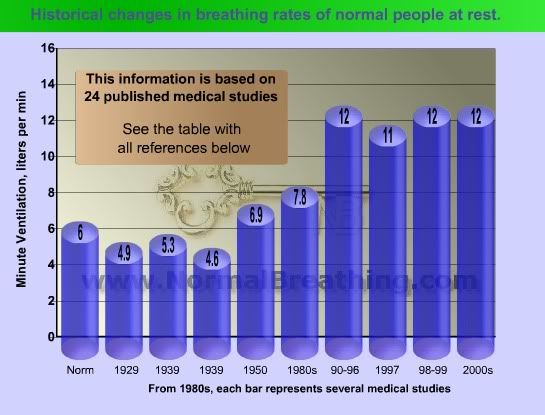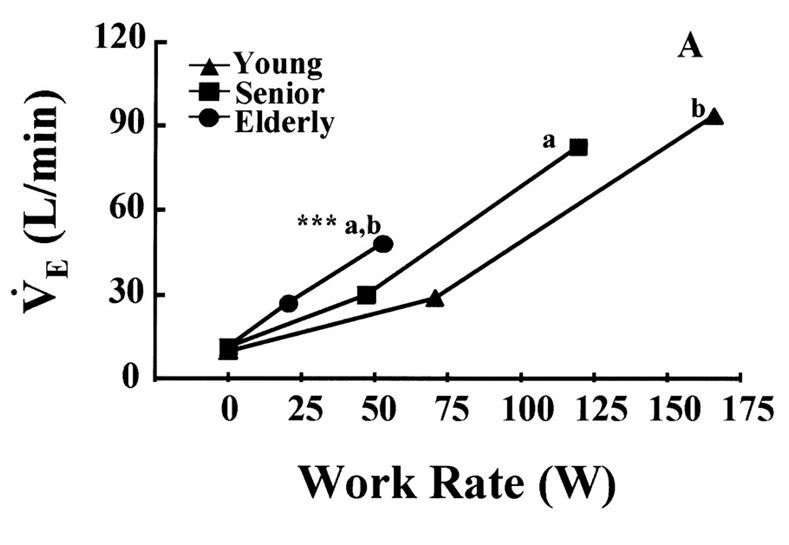Raj wrote:So let's turn the question on its head: if you assume a person has periods of mild hyperventilation during the day, perhaps a habitual way of reacting to stress, and this person trains themselves to stop hyperventilating, what consequences would you expect?
If the assumption is that the underlying disorder is a benign form of Hyperventilation Syndrome, they may get substantial relief from their symptoms.
However, since the likelihood that the hyperventilation is
Raj wrote:perhaps a habitual way of reacting to stress
would only be in the neighborhood of about 10%, then
my assumption is that they could be ignoring a symptom of a potentially lethal other diagnosis, and are going to be looking PFS when the ambulance comes to pick them up because they've just dropped a PE, are having an MI, or any one of a myriad of other situations:
4-Alpha-hydroxyphenylpyruvate hydroxylase deficiency - rapid breathing
Accelerated silicosis - rapid breathing
Acidosis
Acrocephaly - pulmonary stenosis - mental retardation - rapid breathing
Acute circulatory collapse
Acute mercury inhalation - rapid breathing
Acute pneumonias
Acute pulmonary emboli
Acute pulmonary embolism
Acute respiratory distress syndrome, Infant - rapid breathing
Acute Silicosis - rapid breathing
Acyl-CoA dehydrogenase, very long chain, deficiency of - rapid breathing
Adrenal adenoma, familial - rapid breathing
Adrenal Cancer - rapid breathing
Adrenal gland hyperfunction - rapid breathing
Adrenal hemorrhage, neonatal - tachypnea
Adrenal incidentaloma - rapid breathing
Adrenal medulla neoplasm - rapid breathing
Adult respiratory distress syndrome - tachypnea
Adult-onset asthma - rapid breathing
Airway obstruction
Allergic asthma - rapid breathing
Amphetamine abuse - rapid breathing
Amphetamine intoxication
Anaphylactic shock
Anchovy poisoning (clupeotoxin) - rapid breathing
Anemia - rapid breathing
Anemia, Neonatal - rapid breathing
Anoxemia - rapid breathing
Anxiety
Anxiety attack - an imprecise name for a less severe panic attack.
Anxiety disorders
Aortic arches defect - rapid breathing
Aortic coarctation - rapid breathing
Appian-Plutarch syndrome - rapid breathing
Apple seed poisoning - rapid breathing
Argininosuccinase lyase deficiency, neonatal - rapid breathing
Arizona Bark Scorpion poisoning - rapid breathing
Aspiration of a foreign body
Aspiration of gastrointestinal contents
Aspirin-induced asthma - rapid breathing
Asthma - Rapid breathing
Asthma in pregnancy - rapid breathing
Atelectasis
Atopic asthma - rapid breathing
Atrial septal defect 1 - rapid breathing
Atrial septal defect 2 - rapid breathing
Atrial Septal Defect 3 - rapid breathing
Atrial Septal Defect 4 - rapid breathing
Atrial Septal Defect 5 - rapid breathing
Atrial Septal Defect 6 - rapid breathing
Bacteremia - Tachypnoea
Bacterial diseases - Tachypnoea
Bacterial meningitis - Tachypnoea
Bacterial pneumonia
Bindewald-Ulmer-Muller syndrome - rapid breathing
Black widow spider envenomation - rapid breathing
Bland-Garland-White syndrome - rapid breathing
Bland-White -Garland syndrome - rapid breathing
Bonefish poisoning (clupeotoxin) - rapid breathing
Bronchiolitis - rapid breathing
Bronchitis
Bronchopulmonary dysplasia - rapid shallow breathing (tachypnea)
Bullous lung disease
Carbamoyl-phosphate synthase 1 deficiency - rapid breathing
Cardiac arrhythmias
Cardiac malformation - rapid breathing
Cardiac tamponade - rapid breathing
Cardiogenic shock
Cathinone poisoning - rapid breathing
Cerebral hemorrhage
CFS subtype 1 (cognitive, musculoskeletal, sleep, anxiety/depression) - rapid breathing
CFS subtype 2 ( musculoskeletal, pain, anxiety/depression) - rapid breathing
CFS subtype 3 (mild) - rapid breathing
CFS subtype 4 (cognitive, musculoskeletal, sleep, anxiety/depression) - rapid breathing
CFS subtype 5 (musculoskeletal, gastrointestinal) - rapid breathing
CFS subtype 6 (postexertional) - rapid breathing
CFS subtype 7 (pain, infectious, musculoskeletal, sleep, neurological, gastrointestinal, neurocognitive, anxiety/depression) - rapid breathing
Chemical meningitis - Rapid breathing
Chemical pneumonia - rapid breathing
Chemical poisoning - 1,2-Dibromoethane - rapid breathing
Chemical poisoning - acetic acid - rapid breathing
Chemical poisoning - Acetylsalicylic Acid - rapid breathing
Chemical poisoning - Acrolein - rapid breathing
Chemical poisoning - Adiponitrile - rapid breathing
Chemical poisoning - Aldicarb - rapid breathing
Chemical poisoning - Amitraz - rapid breathing
Chemical poisoning - Antifreeze - rapid breathing
Chemical poisoning - Bromates - rapid breathing
Chemical poisoning - Bromophos - rapid breathing
Chemical poisoning - Button batteries - rapid breathing
Chemical poisoning - Carbaryl - rapid breathing
Chemical poisoning - Chlorfenvinphos - rapid breathing
Chemical poisoning - Chlorpyrifos - rapid breathing
Chemical poisoning - Coumaphos - rapid breathing
Chemical poisoning - Cresols - rapid breathing
Chemical poisoning - Cresylic acid - rapid breathing
Chemical poisoning - Demeton-S-methyl - rapid breathing
Chemical poisoning - Diazinon - rapid breathing
Chemical poisoning - Dichlorvos - rapid breathing
Chemical poisoning - Dicrotophos - rapid breathing
Chemical poisoning - Diethylene Glycol - rapid breathing
Chemical poisoning - Diethylene Glycol Monobutyl Ether - rapid breathing
Chemical poisoning - Dinitrocresol - rapid breathing
Chemical poisoning - Dinitrophenol - rapid breathing
Chemical poisoning - Dioxathion - rapid breathing
Chemical poisoning - Disulfoton - rapid breathing
Chemical poisoning - Ethion - rapid breathing
Chemical poisoning - Ethylene Glycol - rapid breathing
Chemical poisoning - Fensulfothion - rapid breathing
Chemical poisoning - Fenthion - rapid breathing
Chemical poisoning - Formaldehyde - rapid breathing
Chemical poisoning - Hydroquinone - rapid breathing
Chemical poisoning - Jet Fuel-4 - rapid breathing
Chemical poisoning - Lewisite - rapid breathing
Chemical poisoning - Lysergic Acid Diethylamide - rapid breathing
Chemical poisoning - Malathion - rapid breathing
Chemical poisoning - Methane - rapid breathing
Chemical poisoning - Methidathion - rapid breathing
Chemical poisoning - Methiocarb - rapid breathing
Chemical poisoning - Methomyl - rapid breathing
Chemical poisoning - Mineral-Based Crankcase Oil - rapid breathing
Chemical poisoning - Parathion - rapid breathing
Chemical poisoning - Petroleum Distillates - Naphtha - rapid breathing
Chemical poisoning - Phosdrin - rapid breathing
Chemical poisoning - Profenofos - rapid breathing
Chemical poisoning - Propoxur - rapid breathing
Chemical poisoning - Rotenone - rapid breathing
Chemical poisoning - Sodium Oleate - rapid breathing
Chemical poisoning - Strychnine - rapid breathing
Chemical poisoning - Terbufos - rapid breathing
Chemical poisoning - Tetraethyl Pyrophosphate - rapid breathing
Childhood asthma - rapid breathing
Choanal atresia
Cholesterol pneumonia - rapid breathing
Chronic bronchitis
Chronic pneumonitis of infancy - rapid breathing
Chylothorax
Coarctation of aorta dominant - rapid breathing
Collapsed lung - rapid breathing
Complete atrioventricular canal - rapid breathing
Congenital arteriovenous shunt - rapid breathing
Congenital diaphragmatic hernia - rapid breathing
Congenital herpes simplex - rapid breathing
Conotruncal heart malformations - rapid breathing
Cor Triatriatum - rapid breathing
Croup - rapid breathing
Defibrination syndrome - Tachypnoea
Dehydration - rapid breathing
Dexedrine overdose - rapid breathing
Diabetic Ketoacidosis - rapid breathing
Diaphragmatic hernia, congenital - rapid breathing
Dilaudid withdrawal - increased respiratory rate
Disulfiram toxicity - tachypnea
Double outlet right ventricle - rapid breathing
Drug-induced asthma - rapid breathing
Duodenal atresia tetralogy of Fallot - rapid breathing
Emotional stress related asthma - rapid breathing
Emphysema
Emphysema, congenital lobar - rapid breathing
Encephalitis
Endocardial fibroelastosis - rapid breathing
Eosinophilic asthma - rapid breathing
Ethylene glycol poisoning - tachypnea
Eucalyptus Oil poisoning - rapid breathing
Exercise
Exercise or exertion
Exercise-induced asthma - rapid breathing
Exertion
Extrinsic asthma - rapid breathing
Fallot syndrome - rapid breathing
Fever
Flail chest
Food Additive Adverse reaction - amines - rapid breathing
Food Additive Adverse reaction - food additives - rapid breathing
Food Additive Adverse reaction - MSG - rapid breathing
Food Additive Adverse reaction - salicylate - rapid breathing
Food Additive Adverse reaction - sulfite - rapid breathing
Food allergy related asthma - rapid breathing
Foreign body in lower airway
Francisella tularenis infection - rapid breathing
Generalized pustular psoriasis - rapid breathing
Gonionemus poisoning - rapid breathing
Head injury
Heart attack
Heart disease
Heatstroke - rapid breathing
Hemorrhage
Hepatic failure
Herbal Agent adverse reaction - Margosa oil - rapid breathing
Herbal Agent adverse reaction - Polygonum multiflorum - rapid breathing
Herbal Agent overdose - Sabah vegetable - rapid breathing
Herring poisoning (clupeotoxin) - rapid breathing
High altitude
Holocarboxylase synthetase deficiency - rapid breathing
Hydrocarbon poisoning - tachypnea
Hyperadrenalism - rapid breathing
Hypercapnea
Hyperosmolar hyperglycemic nonketotic syndrome
Hyperventilation - rapid breathing
Hypoplastic Left Heart Syndrome - rapid breathing
Hypovolemia - rapid breathing
Hypovolemic shock
Hypoxia
Iatrogenic pneumothorax - Tachypnoea
Idiopathic diffuse interstitial fibrosis - rapid breathing
Inborn amino acid metabolism disorder - rapid breathing
Infant asthma - rapid breathing
Interstitial fibrosis
Intrinsic asthma - rapid breathing
Isoniazid toxicity - tachypnoea
Isthmus coarctation - rapid breathing
Kyphoscoliosis
Lactic acidosis congenital infantile - rapid breathing
Large tongue
Laryngeal papillomatosis - rapid breathing
Laryngomalacia
Laryngospasm
Levotransposition of the great arteries - rapid breathing
Lung abscess
Lung disorders
Lupus - rapid breathing
Lymphangiectasia
Malignant mesothelioma
Mayapple poisoning - rapid breathing
Meconium aspiration syndrome - tachypnea
Mediastinal endodermal sinus tumors - tachypnea
Melioidosis - rapid breathing
Mendelson syndrome - rapid breathing
Meningitis
Meningococcal infection - rapid breathing
Mescal poisoning - rapid breathing
Metabolic acidosis
Methamphetamine overdose - rapid breathing
Methanol poisoning - tachypnea
Methionine malabsorption syndrome - rapid breathing
Mexican tea poisoning - rapid breathing
Mitral atresia - rapid breathing
Mixed asthma - rapid breathing
Mixed granulocytic asthma - rapid breathing
Morphine withdrawal - increased respiratory rate
Musculoskeletal chronic fatigue syndrome - rapid breathing
Myocardial infarction
Neonatal Respiratory Distress Syndrome - very rapid breathing (tachypnea)
Nervous system disorders
Neurogenic shock
Neuroleptic Malignant Syndrome - rapid breathing
Neurological disorders
Neutrophilic asthma - rapid breathing
Non-allergic asthma - rapid breathing
Non-atopic asthma - rapid breathing
Obesity associated asthma - rapid breathing
Occupational asthma - rapid breathing
Panic attack - rapid breathing
Panic disorder
Paucigranulocytic asthma - rapid breathing
Pericarditis - rapid breathing
Peritonitis - rapid breathing
Pheochromocytoma - rapid breathing
Pheochromocytoma as part of Neurofibromatosis - rapid breathing
Pleurisy - rapid breathing
Pneumococcal pneumonia - Rapid breathing
Pneumocystic carinii pneumonia - tachypnea
Pneumocystosis - rapid breathing
Pneumocytosis - Tachypnoea
Pneumonectomy
Pneumonia - increased respiratory rate
Pneumonia caused by serotype O11 Pseudomonas Aeruginosa - rapid breathing
Pneumonia, Bacterial - rapid breathing
Pneumonia, Staphylococcal - rapid breathing
Pneumonic plague - rapid breathing
Pneumothorax
Poisoning - Tachypnoea
Poor physical condition
Postoperative pulmonary embolism - Tachypnea
Postoperative respiratory failure - Tachypnoea
Postoperative septicaemia - Tachypnoea
Postpartum haemorrhage - Tachypnoea
Pulmonary atresia - intact ventricular septum - rapid breathing
Pulmonary branches stenosis - rapid breathing
Pulmonary cystic lymphangiectasis - rapid breathing
Pulmonary edema - rapid breathing
Pulmonary embolism - Tachypnea
Pulmonary fibrosis
Pulmonary heart disease - Tachypnoea
Pulmonary hypertension
Pulmonary lymphangiectasia, congenital - rapid breathing
Pulmonary veins stenosis - rapid breathing
Pulmonary venous return anomaly - rapid breathing
Renal failure
Respiratory conditions - Tachypnoea
Respiratory distress syndrome, infant - rapid breathing
Respiratory failure - Tachypnoea
Respiratory infections - Tachypnoea
Respiratory Insufficiency - rapid breathing
Respiratory system cancer - Tachypnoea
Rostan asthma - rapid breathing
Salicylate overdose
Salicylate-sensitive asthma - rapid breathing
Sardine poisoning (clupeotoxin) - rapid breathing
Seasonal asthma - rapid breathing
Secondary pulmonary hypertension - rapid breathing
Sedative dependence - Tachypnoea
See also causes of shallow breathing or breathing difficulty
Septic shock
Septicemia - increased respiratory rate
Severe, refractory asthma - rapid breathing
Sexual aversion disorder - not a common cause of rapid breathing.
Shock - rapid breathing
Shock, Cardiogenic - rapid breathing
Shock, Distributive - rapid breathing
Shock, Endocrine - rapid breathing
Shock, Hemorrhagic - rapid breathing
Shock, Hypovolaemic - rapid breathing
Shock, Neurogenic - rapid breathing
Shock, Obstructive - rapid breathing
Shock, Septic - rapid breathing
Shock, Traumatic - rapid breathing
Silent asthma - rapid breathing
Silicosiderosis - rapid breathing
Silicosis - rapid breathing
Silo unloader syndrome - rapid breathing
Slickhead poisoning (clupeotoxin) - rapid breathing
Small jaw
Steroid-dependant asthma - rapid breathing
Steroid-resistant asthma - rapid breathing
Steroid-resistant asthma, type I - rapid breathing
Steroid-resistant asthma, type II - rapid breathing
Steroid-sensitive asthma - rapid breathing
Stress
Stridor - Tachypnoea
Subglottic narrowing
Subglottic web
Subpulmonary stenosis - rapid breathing
Suffocation - Tachypnoea
Surfactant Metabolism Dysfunction - rapid breathing
Surfactant Metabolism Dysfunction, Pulmonary, 1 - rapid breathing
Surfactant Metabolism Dysfunction, Pulmonary, 2 - rapid breathing
Surfactant Metabolism Dysfunction, Pulmonary, 3 - rapid breathing
Syncope - rapid breathing
Tarpon poisoning (clupeotoxin) - rapid breathing
Tobacco smoke associated asthma - rapid breathing
Transposition of great arteries - rapid breathing
Trauma
Truncus Arteriosus - rapid breathing
Tubatoxin poisoning - rapid breathing
Tuberculosis
Vancomycin resistant enterococcal bacteremia - Tachypnoea
Vascular malposition - Tachypnoea
Vein of Galen aneurysm - Tachypnea
Ventricular septal defect - Tachypnoea
Ventriculo-arterial discordance, isolated - Tachypnoea
Very Long Chain Acyl CoA Dehydrogenase Deficiency - adult-onset - rapid breathing
Very Long Chain Acyl CoA Dehydrogenase Deficiency - Early onset - rapid breathing
Very Long Chain Acyl CoA Dehydrogenase Deficiency - intermediate - rapid breathing
Very-Long-Chain Acyl-CoA Dehydrogenase Deficiency - rapid breathing
Virus-induced asthma - rapid breathing
VLCAD deficiency - Tachypnea
Volume depletion - Tachypnea
Weinstein Kliman Scully syndrome - Tachypnea
Wheezing - Tachypnea
White Chameleon poisoning - rapid breathing
Wiskott-Aldrich Syndrome - Tachypnea
and are lying on the ground practicing "Buteyko breathing".
Muffy















